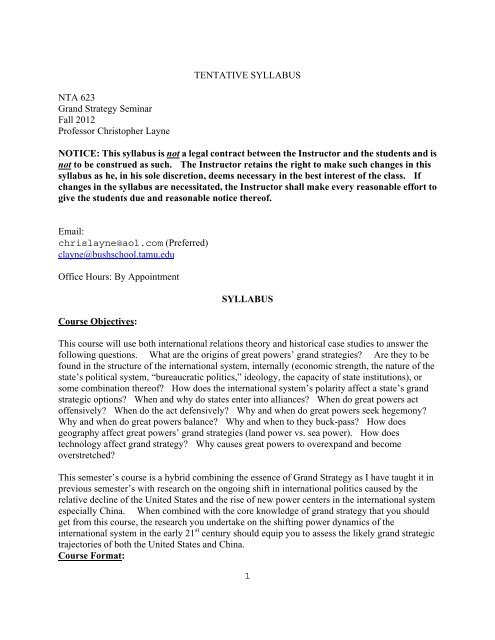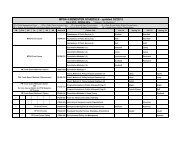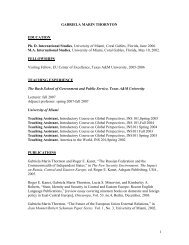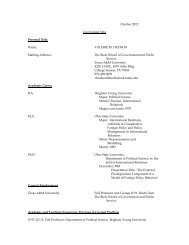Layne - Fall 2012 - Bush School of Government and Public Service
Layne - Fall 2012 - Bush School of Government and Public Service
Layne - Fall 2012 - Bush School of Government and Public Service
You also want an ePaper? Increase the reach of your titles
YUMPU automatically turns print PDFs into web optimized ePapers that Google loves.
NTA 623<br />
Gr<strong>and</strong> Strategy Seminar<br />
<strong>Fall</strong> <strong>2012</strong><br />
Pr<strong>of</strong>essor Christopher <strong>Layne</strong><br />
TENTATIVE SYLLABUS<br />
NOTICE: This syllabus is not a legal contract between the Instructor <strong>and</strong> the students <strong>and</strong> is<br />
not to be construed as such. The Instructor retains the right to make such changes in this<br />
syllabus as he, in his sole discretion, deems necessary in the best interest <strong>of</strong> the class. If<br />
changes in the syllabus are necessitated, the Instructor shall make every reasonable effort to<br />
give the students due <strong>and</strong> reasonable notice there<strong>of</strong>.<br />
Email:<br />
chrislayne@aol.com (Preferred)<br />
clayne@bushschool.tamu.edu<br />
Office Hours: By Appointment<br />
Course Objectives:<br />
SYLLABUS<br />
This course will use both international relations theory <strong>and</strong> historical case studies to answer the<br />
following questions. What are the origins <strong>of</strong> great powers’ gr<strong>and</strong> strategies? Are they to be<br />
found in the structure <strong>of</strong> the international system, internally (economic strength, the nature <strong>of</strong> the<br />
state’s political system, “bureaucratic politics,” ideology, the capacity <strong>of</strong> state institutions), or<br />
some combination there<strong>of</strong>? How does the international system’s polarity affect a state’s gr<strong>and</strong><br />
strategic options? When <strong>and</strong> why do states enter into alliances? When do great powers act<br />
<strong>of</strong>fensively? When do the act defensively? Why <strong>and</strong> when do great powers seek hegemony?<br />
Why <strong>and</strong> when do great powers balance? Why <strong>and</strong> when to they buck-pass? How does<br />
geography affect great powers’ gr<strong>and</strong> strategies (l<strong>and</strong> power vs. sea power). How does<br />
technology affect gr<strong>and</strong> strategy? Why causes great powers to overexp<strong>and</strong> <strong>and</strong> become<br />
overstretched?<br />
This semester’s course is a hybrid combining the essence <strong>of</strong> Gr<strong>and</strong> Strategy as I have taught it in<br />
previous semester’s with research on the ongoing shift in international politics caused by the<br />
relative decline <strong>of</strong> the United States <strong>and</strong> the rise <strong>of</strong> new power centers in the international system<br />
especially China. When combined with the core knowledge <strong>of</strong> gr<strong>and</strong> strategy that you should<br />
get from this course, the research you undertake on the shifting power dynamics <strong>of</strong> the<br />
international system in the early 21 st century should equip you to assess the likely gr<strong>and</strong> strategic<br />
trajectories <strong>of</strong> both the United States <strong>and</strong> China.<br />
Course Format:<br />
1
This is a seminar, not a lecture class. The seminar format is the st<strong>and</strong>ard one for graduate<br />
instruction in top U.S. universities. A seminar means that the students need to take a good deal <strong>of</strong><br />
the ownership <strong>of</strong> the class, <strong>and</strong> show initiative in the discussions. In a seminar, the instructor does<br />
minimal, if any, lecturing, <strong>and</strong> st<strong>and</strong>s on a more or less equal footing with the students during<br />
discussion. The exchange <strong>of</strong> ideas through discussion is how knowledge is gained. A seminar,<br />
however, requires commitment from the students. For this course to work, you must do the<br />
readings, <strong>and</strong> - at equally important - think hard about the issues raised therein. Attendance, <strong>and</strong><br />
participation in the class discussions, is the key to making a seminar work. Therefore, although<br />
roll will not be taken formally, it is important that you attend all scheduled class sessions.<br />
To help focus class discussion, each student is required to submit by email to the instructor, <strong>and</strong> the<br />
discussion leaders, by 9pm the night before class meets, one or two questions, observations, or<br />
particularly interesting responses to the readings.<br />
Requirements:<br />
The grade will be based on three components: (1) Presentation <strong>of</strong> a draft paper for seminar<br />
discussion; (2) Final term paper (on the same topic as presented for seminar discussion); <strong>and</strong> (3)<br />
the assigned research tasks your teams produce on the shifting power dynamics <strong>of</strong> the early 21sst<br />
century international political system. There will be no final examination.<br />
Course Requirements/Grading:<br />
Final Research Paper: 50% <strong>of</strong> course grade. Due Date: 7 December <strong>2012</strong>. Papers (hard copies<br />
only) are due in my box in the Faculty Workroom by 5pm. Papers submitted by fax or email will<br />
not be accepted.<br />
Papers will be an historical case studies that also incorporates the theoretical material covered the<br />
course. Specific topics will be determined by the instructor in consultation with each student.<br />
To the extent possible, I will try to match each student with a topic <strong>of</strong> interest to them.<br />
By 10 September, you are required to submit to me a short (2-4) page paper proposal. This<br />
should set out your hypotheses, data, methodology, <strong>and</strong> a short bibliography. Submit hard copy<br />
only by 5pm, 21 September in my mailbox in the Faculty Mail Room.<br />
Final papers are to be a maximum <strong>of</strong> 25 pages (double-spaced), exclusive <strong>of</strong> endnotes <strong>and</strong><br />
bibliography. Papers must be in a scholarly format, with an introduction, thesis statement, main<br />
body, <strong>and</strong> conclusions. This is a research paper, which means you must use materials outside <strong>of</strong><br />
the assigned readings to enrich your argument <strong>and</strong> analysis. To avoid the dangers <strong>of</strong> plagiarism,<br />
your sources must be properly cited. I prefer that you use the Chicago Manual citation style.<br />
Papers will be graded on the basis <strong>of</strong>: quality <strong>of</strong> critical analysis; creativity; clarity; research effort;<br />
<strong>and</strong> Your ability to combine theory with historical evidence..<br />
For an excellent discussion <strong>of</strong> what makes a good research paper - <strong>and</strong> useful tips on how to write<br />
2
one - I strongly suggest that you read Stephen Van Evera, A Guide to Methods for Students <strong>of</strong><br />
Political Science (Cornell University Press, 1997), pp. 89-95, 97-109, 123-128.<br />
NOTE: It is not acceptable to h<strong>and</strong> in the same assignment for more than one course.<br />
Translation: you cannot “recycle” work you have done for other courses for this class.<br />
Draft Paper <strong>and</strong> Presentation: 10% <strong>of</strong> course grade.<br />
Special Research Team Projects on the Shifting Balance <strong>of</strong> Global Power in the Early 21 st Century:<br />
40% <strong>of</strong> course grade. These grades will be assigned on a team basis.<br />
The 22, 29 October <strong>and</strong> 5 November class meetings will be set aside [tentatively] for<br />
presentations <strong>of</strong> draft papers. Each student will make an oral presentation in class based upon a<br />
draft <strong>of</strong> your research paper. The oral presentations will serve as one <strong>of</strong> the bases for class<br />
discussion during these weeks. The draft paper should be reasonably polished, <strong>and</strong> should not<br />
exceed 15 pages in length. The class discussion <strong>and</strong> critique <strong>of</strong> draft papers should provide<br />
feedback <strong>and</strong> suggestions to incorporate into your final paper. The final paper, therefore, should<br />
show significant revision from the draft paper, based on comments from the instructor <strong>and</strong> from<br />
your peers - as well as your own evolved thinking about your topic.<br />
Draft papers should be circulated by email to the instructor <strong>and</strong> to all class members no<br />
later than 48 hours prior to their scheduled presentation in class.<br />
Discussion Leadership: Discussion leadership is a course requirement but will not be graded.<br />
There are two components to discussion leadership: (1) Leading the class discussion <strong>of</strong> the<br />
assigned weekly readings; <strong>and</strong> (2) serving as discussant/commentator on a draft paper<br />
presentation.<br />
All students will be responsible for leading at least one class discussion. Depending on<br />
enrollment, students may be called upon to lead more than one discussion.<br />
Discussion leaders are responsible for discussing the assigned readings for the class session,<br />
raising questions for class discussion, <strong>and</strong> preparing a Power Point presentation that identifies the<br />
key themes <strong>of</strong> the readings <strong>and</strong> sets out a number <strong>of</strong> discussion questions. Discussion leaders are<br />
to go beyond providing a mere summary <strong>of</strong> the reading (because all students are required to do the<br />
assigned readings). The function <strong>of</strong> discussion leaders in not to regurgitate the assigned readings,<br />
but rather to engage the material, highlight the main points, <strong>and</strong> get the class involved in debating<br />
<strong>and</strong> discussing the material. You should also feel free to bring up what you think is wrong, or<br />
missing, from the arguments made in the readings under discussion. Discussion leaders will be<br />
evaluated on the basis <strong>of</strong> the substance <strong>and</strong> style <strong>of</strong> the presentation, as well as on the quality <strong>of</strong> the<br />
Power Point presentation <strong>and</strong> discussion questions. The instructor will be looking especially for<br />
evidence that you have carefully read <strong>and</strong> thought about the assigned readings. Your<br />
presentations are expected to cover the main points, issues, <strong>and</strong> arguments that arise from the<br />
readings. Discussion leaders should situate the readings theoretically, critique them, dissect the<br />
causal logics <strong>of</strong> the arguments, <strong>and</strong> consider their policy implications.<br />
3
In addition to leading discussions based on assigned readings, each <strong>of</strong> will be required to comment<br />
upon, <strong>and</strong> critique, the draft paper <strong>of</strong> one <strong>of</strong> your classmates following the oral presentation<br />
there<strong>of</strong>. In academic conferences it is st<strong>and</strong>ard procedure to have a discussant critique the papers<br />
<strong>of</strong> the panelists. That is the model here. A good discussant clearly highlights BOTH the<br />
strengths <strong>and</strong> weaknesses <strong>of</strong> the paper in terms <strong>of</strong> its argument, evidence, <strong>and</strong> writing. The<br />
purpose <strong>of</strong> the discussant’s comments is to help the author during the revision process.<br />
Late Assignments:<br />
*Failure to turn-in an assignment on time will result in an automatic lowering <strong>of</strong> the grade<br />
for that assignment by one full letter grade for each 24 hour period between the due date<br />
<strong>and</strong> the date the assignment is turned in. Example: a one date late A assignment would<br />
become a B. This policy will apply to all late assignments unless there is documented good<br />
cause for failure to submit an assignment on time.<br />
*To obtain credit for this class, all course requirements must be fulfilled. Failure to<br />
complete all course assignments will result in a grade <strong>of</strong> F.<br />
Procedure for Appealing Grades:<br />
If you are believe a grade does not fully reflect the quality <strong>of</strong> your work <strong>and</strong> you wish to appeal the<br />
grade, you must submit to me a written statement -<br />
not exceeding 2 pages in length - setting forth with<br />
specificity the reasons you believe that your grade<br />
should be revised. After reviewing your written<br />
statement, I will make an appointment to discuss the<br />
matter with you. After we meet, I will make a<br />
decision on your appeal.<br />
Academic Integrity:<br />
The <strong>Bush</strong> <strong>School</strong> is committed to the development <strong>of</strong> principled leaders for public service. The<br />
commitment to "principled leadership" is a further expansion <strong>of</strong> the Texas A&M student honor<br />
code that states: “An Aggie will not lie, cheat or steal nor tolerate those who do.” Each student<br />
in this course must comply with this code in all work submitted for a grade <strong>and</strong> will be held<br />
accountable accordingly. Anyone who is not prepared to adhere to this st<strong>and</strong>ard should<br />
immediately withdraw from this course.<br />
Specific attention is directed to the requirement to avoid plagiarism, or the appearance <strong>of</strong><br />
plagiarism through sloppy citation. As commonly defined, plagiarism consists <strong>of</strong> passing <strong>of</strong>f as<br />
one's own ideas, words, writings, etc, that which belong to another. In accordance with this<br />
definition, you are committing plagiarism if you copy the work <strong>of</strong> another person <strong>and</strong> turn it in as<br />
your own, even if you have the permission <strong>of</strong> that person. It does not matter from where the<br />
material is borrowed --a book, an article, material <strong>of</strong>f the web, another student's paper– all<br />
constitute plagiarism unless the source <strong>of</strong> the work is fully identified <strong>and</strong> credited. It is important<br />
4
when using a phrase, a distinct idea, concept, a sentence, or sentences from another source to credit<br />
explicitly that source either in the text, a footnote or endnote. Plagiarism is a violation <strong>of</strong><br />
academic <strong>and</strong> personal integrity <strong>and</strong> carries extremely serious consequences. Scholastic<br />
dishonesty (including cheating, multiple submission <strong>of</strong> your work for grades in different courses<br />
<strong>and</strong> plagiarism) will not be tolerated <strong>and</strong> will be punished. Further information can be found at<br />
http://www.tamu.edu/aggiehonor/acadmisconduct.htm<br />
Suspected instances <strong>of</strong> academic misconduct will be referred to the University Honor Committee.<br />
Americans with Disability Act:<br />
The Americans with Disability Act (ADA) is a federal anti-discrimination statute that provides<br />
comprehensive civil rights protection for persons with disabilities. Among other things, this<br />
legislation requires that all students with disabilities be guaranteed a learning environment that<br />
provides for reasonable accommodation <strong>of</strong> their disabilities. If you believe you have a disability<br />
requiring accommodation, please advise the instructor promptly.<br />
Laptops:<br />
Laptop computers may used in the classroom. However, they may be used for class-related<br />
purposes only. If you use a laptop in class I will assume that you have, pursuant to the Aggie<br />
Honor Code, given me your word that you are using it for class-related purposes.<br />
Make-Up Classes:<br />
Should it become necessary to schedule a make-up class, I will consult with the class to find the<br />
most convenient time for the majority <strong>of</strong> the students.<br />
Attendance at make-up sessions is not m<strong>and</strong>atory, <strong>and</strong> because there is no final examination in this<br />
class, students unable to attend a make-up session (or sessions) will not be disadvantaged with<br />
respect to grading because <strong>of</strong> inability to attend. However, if it is necessary to schedule make-up<br />
sessions I hope you will be interested enough in the subject matter <strong>of</strong> this course to attend.<br />
Reading Assignments:<br />
The reading list for this course contains both required <strong>and</strong> suggested readings. The required<br />
readings are divided into two categories. First, there are readings that will be read by the entire<br />
class. It is m<strong>and</strong>atory that you read these, <strong>and</strong> be prepared to discuss them in class. Second,<br />
there are is a “menu” <strong>of</strong> further readings from which students will be required to read some - but<br />
not all - <strong>of</strong> the materials in this category. My goal here is to reduce the overall reading burden on<br />
each <strong>of</strong> you. Although this could change depending on the enrollment in the course, my plan is to<br />
allow each student to choose which <strong>of</strong> the materials in this category they will read. However, I<br />
am going to ask that you each coordinate among yourselves to ensure that each <strong>of</strong> the readings in<br />
the “menu” category is read by at least one member <strong>of</strong> the class, <strong>and</strong> to inform me prior to each<br />
class meeting which <strong>of</strong> you has read which <strong>of</strong> the readings for the week that are in this category.<br />
5
Students are not required to read the suggested readings, <strong>and</strong> will not be held accountable for<br />
them. They are included for informational purposes only in the event you wish to pursue a<br />
particular topic in greater depth than is covered in the assigned readings. The suggested<br />
readings may also help in the preparation <strong>of</strong> your research papers.<br />
NOTE: Additional required readings may be added to - or deleted from - the syllabus as the course<br />
progresses. I will give advance notice, both in class <strong>and</strong> by email, <strong>of</strong> any readings added<br />
to/deleted from the syllabus.<br />
BOOKS<br />
(Recommended, but not required, for purchase)<br />
Graham Allison <strong>and</strong> Philip Zelikow, The Essence <strong>of</strong> Decision: Explaining the Cuban Missile<br />
Crisis (Longman, 2d. Ed., 1999).<br />
Paul Kennedy, The Rise <strong>and</strong> <strong>Fall</strong> <strong>of</strong> British Naval Mastery (Humanity Books, 2006).<br />
Paul Kennedy, The Rise <strong>of</strong> the Anglo-German Antagonism (Humanity Books, 1988)<br />
Paul Kennedy, The Rise <strong>and</strong> <strong>Fall</strong> <strong>of</strong> the Great Powers: Economic Change <strong>and</strong> Military Conflict<br />
from 1500 to 2000 (Vintage Books, 1989).<br />
Beatrice Heuser, The Evolution <strong>of</strong> Strategy: Thinking War from Antiquity to the Present<br />
(Cambridge University Press, 2010).<br />
Williamson Murray, Macgregor Knox, Alvin Bernstein, eds., The Making <strong>of</strong> Strategy: Rulers,<br />
States, <strong>and</strong> Wars (Cambridge University Press, 1996).<br />
Williamson Murray, Richard Hart Simmreich, <strong>and</strong> James Lacey, eds., The Shaping <strong>of</strong> Gr<strong>and</strong><br />
Strategy: Politics, Diplomacy <strong>and</strong> War (Cambridge: Cambridge University Press, 2011).<br />
Peter Paret, Gordon Craig, <strong>and</strong> Felix Gilbert (eds.), Makers <strong>of</strong> Modern Strategy: From Machiavelli<br />
to the Nuclear Age (Princeton University Press, 1986).<br />
All <strong>of</strong> these books are available in paperback. They are available for purchase from the<br />
Bookstore <strong>and</strong> also can be purchased from Amazon.com. At least one hard copy <strong>of</strong> each <strong>of</strong> these<br />
books will be on reserve at the PESL (in the Presidential Conference Center).<br />
All other materials should be available on e-reserve<br />
.<br />
THEORETICAL BACKGROUND<br />
Week 1 (27 August)<br />
What is Gr<strong>and</strong> Strategy <strong>and</strong> Why is it Important?<br />
6
B.H. Liddell Hart, “Fundamentals <strong>of</strong> Strategy <strong>and</strong> Gr<strong>and</strong> Strategy,” in B.H. Liddell Hart, Strategy<br />
(2d. ed.), pp. 319-370<br />
Paul Kennedy, “Gr<strong>and</strong> Strategy in War <strong>and</strong> Peace: Toward a Broader Definition,” in Paul<br />
Kennedy, ed., Gr<strong>and</strong> Strategies in War <strong>and</strong> Peace, pp. 1-7<br />
Williamson Murray <strong>and</strong> Mark Grimsley, “Introduction: On Strategy,” in Murray, Knox, <strong>and</strong><br />
Bernstein, The Making <strong>of</strong> Strategy, pp. 1-23<br />
Williamson Murray, “Thoughts on Gr<strong>and</strong> Strategy,” in Murray, Sinnreich <strong>and</strong> Lacey, The Shaping<br />
<strong>of</strong> Gr<strong>and</strong> Strategy, pp. 1-13.<br />
Richard Sinnreich, “Patterns <strong>of</strong> Gr<strong>and</strong> Strategy,” in in Murray, Sinnreich <strong>and</strong> Lacey, The Shaping<br />
<strong>of</strong> Gr<strong>and</strong> Strategy, pp. 254-270/<br />
Barry Posen, The Sources <strong>of</strong> Military Doctrine: France, Britain, <strong>and</strong> Germany Between the World<br />
Wars, pp. 13-33<br />
Week 2 (3 September)<br />
The Origins <strong>of</strong> Gr<strong>and</strong> Strategy:<br />
The Role <strong>of</strong> the International System<br />
Allison <strong>and</strong> Zelikow, The Essence <strong>of</strong> Decision, “Model 1: The Rational Actor,” pp. 13-76.<br />
John J. Mearsheimer, The Tragedy <strong>of</strong> Great Power Politics, pp. 29-54.<br />
Kenneth Waltz, “The Origins <strong>of</strong> War in Neorealist Theory,” Journal <strong>of</strong> Interdisciplinary History,<br />
18:4 (Spring 1988), pp. 615-628.<br />
The Origins <strong>of</strong> Gr<strong>and</strong> Strategy:<br />
The Role <strong>of</strong> Polarity<br />
Karl Deutsch <strong>and</strong> J. David Singer, “”Multipolar Power Systems <strong>and</strong> International Stability,”<br />
World Politics, 16:3 (April 1964), pp. 390-406.<br />
John J. Mearsheimer, “Back to the Future: Instability in Europe After the Cold War,” International<br />
Security, 15:1 (Summer 1990), pp. 5-56 (read pp. 13-19 only)<br />
Stephen Van Evera, “Primed for Peace: Europe After the Cold War,” International Security, 15:3<br />
(Winter 1990/91), pp. 7-57 (read pp. 33-40 only).<br />
Kenneth Waltz, “The Stability <strong>of</strong> a Bipolar World,” Daedalus, 43:3 (Summer 1964), pp. 881-909.<br />
7
The Origins <strong>of</strong> Gr<strong>and</strong> Strategy:<br />
The Role <strong>of</strong> Power Transitions<br />
A. F. K. Organski, World Politics (1968), Chapter 14.<br />
A. F. K. Organski <strong>and</strong> Jacek Kugler, The War Ledger (1980), pp. 13-28.<br />
Jack S. Levy, “Long Cycles, Hegemonic Transitions, <strong>and</strong> the Long Peace,” in Charles W. Kegley,<br />
ed., The Long Postwar Peace (1991), pp. 147-176.<br />
Week 3 (10 September)<br />
The Origins <strong>of</strong> Gr<strong>and</strong> Strategy:<br />
The Role <strong>of</strong> Unit Level Factors - An Overview<br />
Allison & Zelikow, The Essence <strong>of</strong> Decision, pp. 143-196, 255-324.<br />
Barry Posen, The Sources <strong>of</strong> Military Doctrine, pp. 34-80.<br />
The Origins <strong>of</strong> Gr<strong>and</strong> Strategy:<br />
The Role <strong>of</strong> Unit Level Factors - Economics<br />
Edward Meade Earle, “Adam Smith, Alex<strong>and</strong>er Hamilton, Friedrich List,” in Peter Paret, ed.,<br />
Makers <strong>of</strong> Modern Strategy from Machiavelli to the Nuclear Age, pp. 217-261.<br />
Paul Kennedy, The Rise <strong>and</strong> <strong>Fall</strong> <strong>of</strong> the Great Powers, pp. 3-30.<br />
The Origins <strong>of</strong> Gr<strong>and</strong> Strategy:<br />
The Role <strong>of</strong> Unit Level Factors - Strategic Culture<br />
Colin Dueck, Reluctant Crusaders: Power, Culture, <strong>and</strong> Change in American Gr<strong>and</strong> Strategy, pp.<br />
9-20.<br />
Colin S. Grey, “National Styles in Strategy: The American Example,” International Security, 6:2<br />
(<strong>Fall</strong> 1981), pp. 21-47.<br />
Alastair Ian Johnson, “Thinking About Strategic Culture,” International Security, 19:3 (Spring<br />
1995), pp. 32-64.<br />
Week 4 (17 September)<br />
The Origins <strong>of</strong> Gr<strong>and</strong> Strategy:<br />
The Role <strong>of</strong> Unit Level Factors - Regime Type <strong>and</strong> Ideology<br />
Michael W. Doyle, “Liberalism <strong>and</strong> World Politics, American Political Science Review, 80:4<br />
8
(December 1986), pp. 1151-1169.<br />
G. John Ikenberry, “Institutions, Strategic Restraint, <strong>and</strong> the Persistence <strong>of</strong> American Postwar<br />
Order,” International Security, 23:3 (Winter 1998/1999), pp. 43-78.<br />
Michael C. Desch, “America’s Libreral Illliberalism: The Ideological Origins <strong>of</strong> Overreaction in<br />
U.S. Foreign Policy,” International Security, 32:3 (Winter 2007/2008), pp. 7-43.<br />
Jonathan Monten, “The Roots <strong>of</strong> the <strong>Bush</strong> Doctrine: Power, Nationalism, <strong>and</strong> Democracy<br />
Promotion in U.S. Strategy,” International Security, 29:4 (Spring 2005), pp. 112-156.<br />
Joseph S. Nye, Jr., S<strong>of</strong>t Power: The Means to Success in World Politics, pp. 1-32<br />
The Origins <strong>of</strong> Gr<strong>and</strong> Strategy:<br />
The Role <strong>of</strong> Unit Level Factors: The Primacy <strong>of</strong> Innenpolitik<br />
Christopher <strong>Layne</strong>, The Peace <strong>of</strong> Illusions, pp. 25-39, 118-133.<br />
Michael R. Gordon, “Domestic Politics <strong>and</strong> the Origins <strong>of</strong> the First World War: The British <strong>and</strong><br />
German Cases,” Journal <strong>of</strong> Modern History, 46:2 (June 1974), pp. 191-226.<br />
Week 5 (September 24)<br />
TYPES OF GRAND STRATEGIES<br />
Gr<strong>and</strong> Strategic Options - Hegemony<br />
Robert Gilpin, War <strong>and</strong> Change in World Politics, p. 187-210.<br />
Christopher <strong>Layne</strong>, “The Unipolar Illusion: Why New Great Powers Will Rise,” International<br />
Security, 17:3 (Spring 1993), pp. 5-51.<br />
William Wohlforth, “The Stability <strong>of</strong> a Unipolar World,” International Security, 21:1 (Summer<br />
1999), pp. 1-36.<br />
Gr<strong>and</strong> Strategic Options - Balancing <strong>and</strong> B<strong>and</strong>wagoning<br />
John Mearsheimer, Tragedy <strong>of</strong> Great Power Politics, pp. 138-167.<br />
Stephen Walt, The Origins <strong>of</strong> Alliances, pp. 17-33.<br />
Thomas J. Christenson <strong>and</strong> Jack Snyder, “Chain Gangs <strong>and</strong> Passed Bucks: Predicting Alliance<br />
Patterns in Multipolarity,” International Organization, 44:2 (Spring 1990), pp. 137-168.<br />
9
Robert G. Kaufman, “To Balance or B<strong>and</strong>wagon? Alignment Decisions in the 1930s,” Security<br />
Studies, 1:3 (Spring 1992), pp. 417-447.<br />
R<strong>and</strong>all Schweller, “Unanswered Threats: A Neoclassical Realist Theory <strong>of</strong> Underbalancing,”<br />
International Security, 29:2 (<strong>Fall</strong> 1994), pp. 159-201.<br />
Glenn Snyder, “The Security Dilemma in Alliance Politics,” World Politics, 36:4 (July 1984), pp.<br />
461-495.<br />
Gr<strong>and</strong> Strategic Options - Buck-Passing<br />
<strong>and</strong> Offshore Balancing<br />
John Mearsheimer, Tragedy <strong>of</strong> Great Power Politics, pp. 234-267.<br />
Christopher <strong>Layne</strong>, The Peace <strong>of</strong> Illusions: American Gr<strong>and</strong> Strategy from 1940 to the Present,<br />
pp. 16-23, 159-192.<br />
Week 6 (1 October)<br />
GEOGRAPHY AND STRATEGY<br />
Geography <strong>and</strong> Gr<strong>and</strong> Strategy:<br />
Sir Halford Mackinder, “The Geographic Pivot <strong>of</strong> History,” The Geographical Journal, 22:4<br />
(April 1904), pp. 421-437.<br />
Paul Kennedy, “Mahan vs. Mackinder” in Paul Kennedy, The Rise <strong>and</strong> <strong>Fall</strong> <strong>of</strong> British Naval<br />
Mastery, pp. 177-204.<br />
Colin Gray, “In Defence <strong>of</strong> the Heartl<strong>and</strong>: Sir Halford Mackinder <strong>and</strong> His Critics a Hundred Years<br />
On,” Comparative Strategy, 23:1 (January-March 2004), pp. 9-25.<br />
Christopher Fettweis, “Sir Halford Mackinder, Geopolitics, <strong>and</strong> Policymaking in the 21 st<br />
Century,” Parameters (Summer 2000), pp.<br />
58-71.<br />
Robert J. Art, “The United States, The Balance <strong>of</strong> Power, <strong>and</strong> World War II: Was Spykman<br />
Right?” Security Studies, 14:3 (2005), pp. 365–406.<br />
Naval Power<br />
Beatrice Heuser, The Evolution <strong>of</strong> Strategy, Chapters 8-11<br />
Air Power <strong>and</strong> Nuclear Weapons<br />
10
Beatrice Heuser, The Evolution <strong>of</strong> Strategy, Chapters 12-14.<br />
David McIsaac, “Voices from the Central Blue: The Air Power Theorists” in Peter Paret <strong>and</strong><br />
Gordon A. Craig, eds., Makers <strong>of</strong> Modern Strategy from Machiavelli to the Nuclear Age, pp.<br />
624-647.<br />
Lawrence Freedman, “The First Two Generations <strong>of</strong> Nuclear Strategists,” in Peter Paret <strong>and</strong><br />
Gordon A. Craig, eds., Makers <strong>of</strong> Modern Strategy from Machiavelli to the Nuclear Age, pp.<br />
735-778.<br />
Week 7 (8 October)<br />
PRACTICING GRAND STRATEGY: HISTORICAL CASE STUDIES<br />
Imperial Recessional: Britain <strong>and</strong> the<br />
Gr<strong>and</strong> Strategy <strong>of</strong> Decline<br />
Kennedy, The Rise <strong>and</strong> <strong>Fall</strong> <strong>of</strong> British Naval Mastery, pp. 239-298.<br />
John Gooch, “The Weary Titan: Strategy <strong>and</strong> Policy in Great Britain, 1890-1918,” in in Murray,<br />
Knox, & Bernstein, The Making <strong>of</strong> Strategy, pp. 278-306.<br />
Williamson Murray, “The Collapse <strong>of</strong> Empire: British Strategy, 1919-1945,” in Murray, Knox, &<br />
Bernstein, The Making <strong>of</strong> Strategy, pp. 393-427.<br />
Zara Steiner, “The <strong>Fall</strong> <strong>of</strong> Great Britain,” in Geir Lundestad, ed., The <strong>Fall</strong> <strong>of</strong> Great Powers: Peace,<br />
Stability, <strong>and</strong> Legitimacy, pp. 47-80.<br />
Week 8 (15 October)<br />
WORLD WAR I<br />
Background: The Age <strong>of</strong> Total War<br />
Beatrice Heuser, The Evolution <strong>of</strong> Strategy, Chapters 5-7<br />
Germany: The Strategy <strong>of</strong> a Continental Power<br />
Marcus Jones, “Strategy as Character: Bismarck <strong>and</strong> the Prusso-German Question, 1862-1878" in<br />
Murray, Simmreich, <strong>and</strong> Lacey, The Shaping <strong>of</strong> Strategy<br />
Holger H. Herwig, “Strategic Uncertainties <strong>of</strong> a Nation-State: Prussia-Germany, 1871-1918,” in in<br />
Murray, Knox, & Bernstein, The Making <strong>of</strong> Strategy, pp. 242-277.<br />
11
Michael Geyer, “German Strategy in the Age <strong>of</strong> Machine Warfare, 1914-1945, in Peter Paret <strong>and</strong><br />
Gordon A. Craig, eds., Makers <strong>of</strong> Modern Strategy from Machiavelli to the Nuclear Age, pp.<br />
527-597.<br />
Weeks 9, 10 & 11 (22, 29 October, 5 November)<br />
Week 12 (12 November)<br />
The Anglo-German Rivarly: Economics, Ideology, Innenpolitik <strong>and</strong> the Balance <strong>of</strong> Power<br />
Paul Kennedy, The Rise <strong>of</strong> the Anglo-German Antagonism<br />
The Failure <strong>of</strong> Gr<strong>and</strong> Strategy<br />
Jack Snyder, The Ideology <strong>of</strong> the Offensive: Military Decisionmaking <strong>and</strong> the Disasters <strong>of</strong> 1914,<br />
pp. 15-40.<br />
Stephen Van Evera, “The Cult <strong>of</strong> the Offensive <strong>and</strong> the Origins <strong>of</strong> the First World War,”<br />
International Security, 9:1 (Summer 1984), pp. 58-107.<br />
Daniel A. Baugh, "British Strategy During the First World War in the Context <strong>of</strong> Four Centuries:<br />
Blue-Water versus Continental Commitment," in Daniel M. Masterson, ed., Naval History: The<br />
Sixth Symposium <strong>of</strong> the U.S. Naval Academy.<br />
Richard Hart Sinnreich, “About Turn: British Strategic Transformation from Salisbury to Grey,”<br />
in Murray, Sinnreich, <strong>and</strong> Lacey, The Shaping <strong>of</strong> Strategy, pp. 111-146.<br />
Week 13 (19 November )<br />
British Gr<strong>and</strong> Strategy Between the World Wars<br />
Christopher <strong>Layne</strong>, “Security Studies <strong>and</strong> the Use <strong>of</strong> History: Neville Chamberlain’s Gr<strong>and</strong><br />
Strategy Revisited,” Security Studies, 17:3 (July 2008), pp. 397-437.<br />
Norrin Ripsman <strong>and</strong> Jack S. Levy, “ Wishful Thinking or Buying Time: The Logic <strong>of</strong> British<br />
Appeasement in the 1930s,” International Security, 33:2 (<strong>Fall</strong> 2008), pp. 148-181.<br />
Williamson Murray, “British Gr<strong>and</strong> Strategy, 1933-1942,” in Murray, Sinnreich, <strong>and</strong> Lacey, The<br />
Shaping <strong>of</strong> Strategy, pp. 147-181.<br />
Weeks 13 <strong>and</strong> 14<br />
1. A Shifting Balance <strong>of</strong> Power?<br />
Gr<strong>and</strong> Strategy <strong>and</strong> the Emerging Sino-American Relationship<br />
12
2. The Future <strong>of</strong> Sino-American Relations<br />
2. Lessons <strong>of</strong> the Past?<br />
Read the following, all <strong>of</strong> which will be on hard copy reserve at the PESL:<br />
Fareed Zakaria, The Post-American World (New York: W. W. Norton, 2008).<br />
Robert Kagan, The World America Made (New York: Knopf, <strong>2012</strong>)<br />
Robert Lieber, Power <strong>and</strong> Willpower in the American Future: Why the United States is Not<br />
Destined to Decline Cambridge University Press, <strong>2012</strong>)<br />
Edward Luce, Time to Start Thinking: America in the Age <strong>of</strong> Descent (New York: Atlantic<br />
Monthly Press, <strong>2012</strong>).<br />
Martin Jacques, When China Rules the World: The End <strong>of</strong> the Western World <strong>and</strong> the Birth <strong>of</strong> a<br />
new Global Order (New York: Penguin Press, 2009).<br />
G. John Ikenberry, Liberal Leviathan: The Origins, Crisis, <strong>and</strong> Transformation <strong>of</strong> the American<br />
World Order (Princeton: Princeton University Press, 2011).<br />
- <strong>and</strong> (on e-reserve) -<br />
Michael Beckley, “China’s Century: Why America’s Edge Will Endure, International Security,<br />
36:3 (Winter 2011/<strong>2012</strong>), pp. 41-78.<br />
SUGGESTED READINGS - FYI ONLY<br />
Strategic Culture<br />
Alastair Ian Johnson, Cultural Realism: Strategic Culture <strong>and</strong> Gr<strong>and</strong> Strategy in Chinese History<br />
(1995).<br />
Elizabeth Keir, Imagining War: French <strong>and</strong> British Military Doctrine Between the Wars (1997).<br />
Stephen Peter Rosen, Societies <strong>and</strong> Military Power: India <strong>and</strong> its Armies (1996).<br />
Types <strong>of</strong> Gr<strong>and</strong> Strategies<br />
Innis Claude, Power <strong>and</strong> International Relations (1962), pp. 3-93.<br />
Michael W. Doyle, Ways <strong>of</strong> War <strong>and</strong> Peace (1997), Chapter 5.<br />
13
Edward Gulick, Europe’s Classical Balance <strong>of</strong> Power (1955), Part I.<br />
Glenn H. Synder, Alliance Politics (1997).<br />
John A. Vasquez <strong>and</strong> Colin Elman, eds., Realism <strong>and</strong> the Balancing <strong>of</strong> Power (2002)<br />
Geography<br />
Nicholas J. Spykman, America’s Strategy in World Politics<br />
Seapower<br />
Alfred Thayer Mahan, The Influence <strong>of</strong> Sea Power on History, 1660-1783<br />
Germany from Bismarck to Hitler<br />
Robert M. Citino, The German Way <strong>of</strong> War: From the Thirty Years’ War to the Third Reich.<br />
Robert T. Foley, German Strategy <strong>and</strong> the Path to Verdun: Erich von Falkenhayn <strong>and</strong> the<br />
Development <strong>of</strong> Attrition, 1870-1916.<br />
Holger Herwig, “Luxury Fleet:” The Imperial German Navy, 1888-1918.<br />
Eckhart Kehr, Battleship Building <strong>and</strong> Party Politics.<br />
Terrence Zuber, Inventing the Schlieffen Plan: German War Planning, 1871-1914 (2003).<br />
Britain <strong>and</strong> the Strategy <strong>of</strong> Decline<br />
Correlli Barnett, The Collapse <strong>of</strong> British Power<br />
Aaron Friedberg, The Weary Titan: Britain <strong>and</strong> the Experience <strong>of</strong> Relative Decline, 1895-1905<br />
(1988).<br />
Britain <strong>and</strong> World War I<br />
Stephen Broadberry <strong>and</strong> Mark Harrison, eds., The Economics <strong>of</strong> World War I<br />
John Charmley, Splendid Isolation? Britain, the Balance <strong>of</strong> Power <strong>and</strong> the Origins <strong>of</strong> the First<br />
World War (1999).<br />
Niall Ferguson, The Pity <strong>of</strong> War<br />
Elizabeth Greenhalgh, Victory Through Coalition: Britain <strong>and</strong> France During the First World<br />
War (2005).<br />
14
Michael Howard, The Continental Commitment<br />
Michael Howard, The British Way in Warfare: A Reappraisal (1974).<br />
Eric W. Osborne, Britain’s Blockade <strong>of</strong> Germany, 1914-1919 (2004).<br />
David French, The British Way in Warfare, 1688-2000 (1990).<br />
British Gr<strong>and</strong> Strategy Between the Wars<br />
John Charmley, Chamberlain <strong>and</strong> the Lost Peace (1989).<br />
David Edgerton, Warfare State: Britain, 1920-1970<br />
Paul Kennedy, The Realities Behind Diplomacy: Background Influences on British External<br />
Policy, 1865-1980 (1981).<br />
James P. Levy. Appeasement <strong>and</strong> Rearmament: Britain: 1936-1939<br />
Frank McDonough, Neville Chamberlain, Appeasement, <strong>and</strong> the British Road to War (1991).<br />
Williamson Murray. The Change in the European Balance <strong>of</strong> Power, 1938-1939: The Path to Ruin<br />
(1984).<br />
R. A. C. Parker, Chamberlain <strong>and</strong> Appeasement: British Policy <strong>and</strong> the Coming <strong>of</strong> the Second<br />
World War (1993).<br />
G.C. Peden, British Rearmament <strong>and</strong> the Treasury.<br />
David Dilks, “‘We Must Hope for the Best <strong>and</strong> Prepare for the Worst:’ The Prime Minister, the<br />
Cabinet, <strong>and</strong> Hitler’s Germany, 1937-1939, Proceedings <strong>of</strong> the British Academy, LXXIII (1987).<br />
David Dilks, “Appeasement Revisited,” University <strong>of</strong> Leeds Review, 15 (1972).<br />
15









